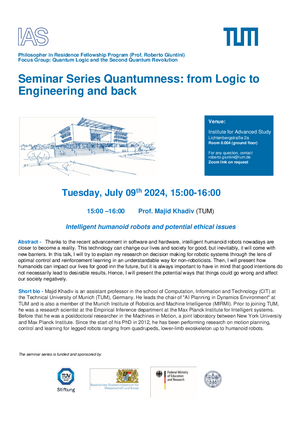Seminar Series Quantumness: from Logic to Engineering and back on July 9
Events |
The burgeoning research into quantum information and computation marks a significant milestone that can be dubbed “the second quantum revolution”. The first quantum revolution of the 20th century deeply changed the fundamental concepts of physics and our understanding of the physical world. The second quantum revolution of the 21st century is leading to dramatic technological changes in our society and shaping new conceptual and logical paradigms. Munich Quantum Valley serves as an exemplary case, bringing together fundamental research and practical application.
In the context of his Philosopher in Residence Fellowship, Prof. Roberto Giuntini has invited Prof. Fabio Roli (University of Genova, University of Cagliari), who will give a lecture on Wednesday, June 5, on the topic of "From known knowns to unknown unknowns in AI. Historical and technical issues".
The Seminar Series is organized by Prof. Dr. Roberto Giuntini (Philosopher in Residence) and his hosts: Prof. Dr. Hans-Joachim Bungartz, Prof. Dr. Stefania Centrone, Prof. Klaus Mainzer
For further information, please contact roberto.giuntini(at)tum.de
Date: July 9, 2024
Time: 15:00-16:00
Venue:
Institute for Advanced Study
Lichtenbergstraße 2a
Room 0.004 (ground floor)
85748 Garching
Program:
15:00-16:00 Prof. Majid Khadiv (TUM)
Intelligent humanoid robots and potential ethical issues
Abstract
Thanks to the recent advancement in software and hardware, intelligent humanoid robots nowadays are closer to become a reality. This technology can change our lives and society for good, but inevitably, it will come with new barriers. In this talk, I will try to explain my research on decision making for robotic systems through the lens of optimal control and reinforcement learning in an understandable way for non-roboticists. Then, I will present how humanoids can impact our lives for good inn the future, but it is always important to have in mind that good intentions do not necessarily lead to desirable results. Hence, I will present the potential ways that things could go wrong and affect our society negatively.
Short bio
Majid Khadiv is an assistant professor in the school of Computation, Information and Technology (CIT) at the Technical University of Munich (TUM), Germany. He leads the chair of "AI Planning in Dynamics Environment" at TUM and is also a member of the Munich Institute of Robotics and Machine Intelligence (MIRMI). Prior to joining TUM, he was a research scientist at the Empirical Inference department at the Max Planck Institute for Intelligent systems. Before that he was a postdoctoral researcher in the Machines in Motion, a joint laboratory between New York University and Max Planck Institute. Since the start of his PhD in 2012, he has been performing research on motion planning, control and learning for legged robots ranging from quadrupeds, lower-limb exoskeleton up to humanoid robots.
